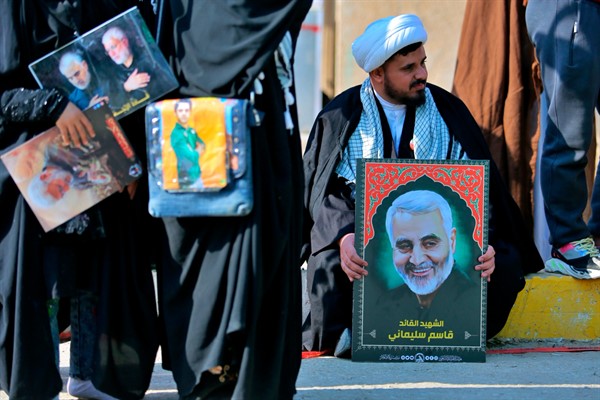The U.S.S. Nimitz was leaving the Middle East, until it wasn’t. The Pentagon’s abrupt reversal of its move late last week to send the aircraft carrier home is the latest sign of an ominous standoff with Iran in the last, chaotic days of Donald Trump’s presidency. A year ago, Trump ordered the brazen drone strike in Baghdad that killed Iran’s top military commander, Maj. Gen. Qassem Soleimani. Fears that it would start a full-fledged war dissipated after Iran made a calculated show of retaliation, firing a barrage of ballistic missiles at bases in Iraq housing U.S. troops. There were no deaths or immediate reported casualties, although the Pentagon later disclosed that more than 100 American soldiers had suffered traumatic brain injuries in the attacks.
Since then, Iran, by all accounts, has been biding its time. Despite the injuries to American troops, the Iranian response last January seemed designed to make headlines and look like retaliation—but without escalating things any further. For the U.S. and its allies in the region, the blowback from Soleimani’s killing was never likely to be immediate, given how Iran operates: often through proxies, and incrementally, in order to maximize the impact and minimize the costs for Tehran. Sure enough, there was a steady rise in proxy attacks on U.S. forces and interests in Iraq throughout 2020, even if they didn’t grab headlines like the missile strikes last January.
As the anniversary of Soleimani’s killing approached ahead of the New Year, so did fears of a more direct Iranian attack on U.S. personnel, which prompted several recent military shows of force from the Trump administration, including flyovers of B-52 bombers around the Persian Gulf. But the reported U.S. intelligence about an Iranian attack to “avenge” the death of Soleimani has been vague. The back-and-forth about whether the Nimitz would remain in the Gulf appeared to reflect a tug-of-war within the Pentagon itself over the urgency of Iran’s apparent threats and whether flexing America’s military might would instead provoke Iran, rather than deter it.

